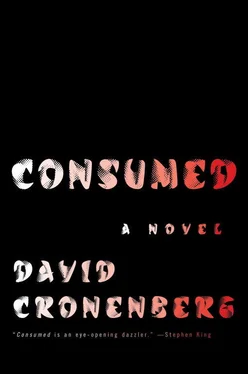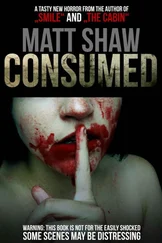THE TRIGGER WAS THE RELIGION of the breast, of the fluid of the flesh which is there to nourish, to create more flesh. And then there was an actual breast, Célestine’s wonderful left breast, which was full, not of milk and milk glands, but a buzzing, bristling hodgepodge of insects of every shape and configuration. Yes. “My left breast is a bag full of insects. I don’t know why it’s attached to me, and I would like very much to… disconnect it. You can have it afterwards, if you like. I know you’re fond of it.”
We were on the jury at the Cannes Film Festival, the only two members who were not moviemaking professionals. The year before, it had been an American opera singer and a computer-game designer. Sequestered in a deluxe villa in the hills overlooking Cannes, we were to discuss in the most leisurely and free-form manner all questions of cinema and society with our nine jury colleagues—including our president, the Serbian actor Dragan Štimac—while eating the most exquisite meals and wandering the most Arcadian gardens. Eventually, we would sit around the grand table in the impressive ballroom and vote for the various awards. There were twenty-two films in the competition for the Palme d’Or and several other intensely anticipated and analyzed prizes.
The villa was said to belong to a ninety-three-year-old Russian countess, a former beauty who was actually lurking somewhere on the premises, hidden from view, not wanting to be seen but thrilling to the excitement of judgment on art that thronged her halls. It was in the grotesquely Russianate pool anteroom, in a changing room tiled like the Hermitage, that Célestine pulled my face to her naked left breast and said, in a voice shivering with horror, “Listen!”
I listened. I heard her heart, trip-hammering. “Your tachycardia,” I said. “Can you control it? Do you need your pills?” Her face was disfigured by fear; it was, I confess, a face I despised, a rare face. She squeezed her breast, jounced it like a bag of cherries. “Entomology,” she said. “Bag of bugs. Listen to them in there. They would like to come out. Especially the Hymenoptera. They tend to be claustrophobic. Which is strange, of course, because my breast is very much like a wasp nest, and you’d think they’d be comfortable in there.” She was really crushing and kneading her breast in her hands, and I gently pulled them away and held her wrists down on her thighs. She sighed, her face relaxed, and she laughed a small laugh.
I had never heard anything like this from her before. It shocked me and terrified me. It was as though she had had a stroke of some bizarre kind, and the strangeness of her face supported that thought. The pressure was also bizarre, because soon we would have to gather around that table with the jury and the chief of the festival and have solemn discussions and arguments and rancorous voting. I tried to turn it into a joke, a spontaneous piece of performance art. “This is your response to the North Korean film, isn’t it? The North Korean film has burrowed into your breast, your left-wing breast, your Red breast.” I knew the movie had affected her profoundly, and had already disturbed many sleeping Marxist dogs which never leave their French intellectual kennels. But she screamed at me, and moaned, and I was terrified that the jury would become a criminal jury and they would convict us and we would never be allowed to leave the czarist villa. No one came to monitor us, though. We had heard many shrieks and shouts and arguments and morbid moanings throughout the course of the evening before, then the night, then this Sunday morning, the Sunday of the palmarès . A passionate and creative group of cineastes.
And so the essay. It was really a letter to me, a confession she could make in no other way, published in the Paris magazine Sartre , though I had begged her not to. It was too intimate, I said. But she said, “Philosophy is intimate, the most intimate act of thinking.” And so: “The Judicious Destruction of the Insect Religion,” an essay by Célestine Arosteguy. Of course, those of us on the jury of that year would hear the resonance. The North Korean film was called The Judicious Use of Insects , and in her essay Célestine confesses that the movie triggered the “stroke”—of luck?—but reveals that the breast disconnect, the insect connection, had been building for years and so terrified her that she couldn’t speak of it to anyone, not me, not her beloved physician. She describes the scene of the ultimate vote for the Palm. The president had asked the jury for the titles of all their proposed candidates for the Palm to be handwritten on a piece of festival paper—complete with golden embossed palm symbol—and passed to him. When he came across her paper, upon which she had written the title of the North Korean film, he took his cigar lighter out of his pocket and set fire to it, tossing it into the ashtray which he himself had brought every day to our meeting room in the Palais des Festivals and now brought to the villa in defiance of the non-smoking regulations. “I was not allowed to bring my nine-millimeter pistol,” he said, with his characteristic sarcasm-dripping smile, “so this will have to do.” The festival’s artistic delegate, who was there to certify the legitimacy of the voting procedure, was horrified at this barbarity and gently admonished the jury president. But he would not be cowed. “If this thing wins the vote for the Palm, or in fact for anything at all, I shall resign as president and I’ll let everyone know why.” And his look to Célestine was hideous, mocking, malicious, and misogynistic. I was there too, of course. I did not intend to vote for the North Korean film, but I had not yet revealed my own choice.
There was on our jury an aged, angry, exiled North Korean director, Bak Myun Mok, who was obviously an enemy of the director of the North Korean film in competition. He was prepared to do anything to prevent his entrenched countryman from winning a prize, and so he was campaigning—none too subtly—against him. He turned specifically to me and spread his hands in helpless despair. His translator, Yolanda, was a shy young Spanish woman with short, straight black hair that suggested she was trying to look Korean. Even the way she held her mouth was somehow Korean. Yolanda was not comfortable with what he was saying. “You are a philosopher,” she said to me, beginning her translation, but then paused and looked at him apprehensively, almost begging him to say something other than what he was actually saying. In response to this insolence, the director picked up a pencil—we had all been provided with pencils and pads of paper, so charmingly retro—and prodded her viciously, twice, in her delicate, exposed clavicle. Though there was an eraser in the end of the pencil, it left an angry red mark almost immediately.
The translator turned back to me with wide apologetic eyes and continued. “You are a philosopher,” she said, “and that meat dog of a wife of yours is also a philosopher. Both of you professional philosophers, whatever that means. Can you not explain to the bitch that the movie, even the title, The Judicious Use of Insects , is not philosophy, and not art, but politics of the worst, most repressive kind. And to give this wretched, sinister movie any prize would be to shackle the art of cinema to the wall of political expediency.”
“‘Meat dog of a wife’?” I said to Yolanda. “He really said that? And ‘the bitch’?”
“Under his breath, yes, he said those things.” Yolanda’s voice shook with distress, and her eyes became shiny with tears. “I made sure that I did not misunderstand him. I asked him to reconsider what he was saying. And he said those words again, no longer under his breath.” Then, as a tremulous pedagogical afterthought—Yolanda was trying to acquire a French teaching certificate—she added, “In Korea, meat dogs are called nureongi or hwangu , meaning ‘yellow dog.’ You don’t let them into your house. ‘Bitch’ is girl dog.”
Читать дальше
Конец ознакомительного отрывка
Купить книгу







![David Jagusson - Fesselspiele mit Meister David [Hardcore BDSM]](/books/486693/david-jagusson-fesselspiele-mit-meister-david-har-thumb.webp)




